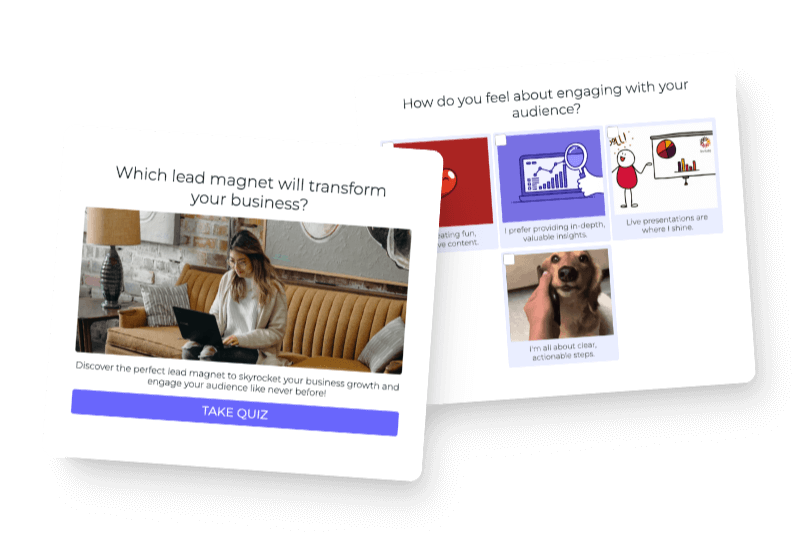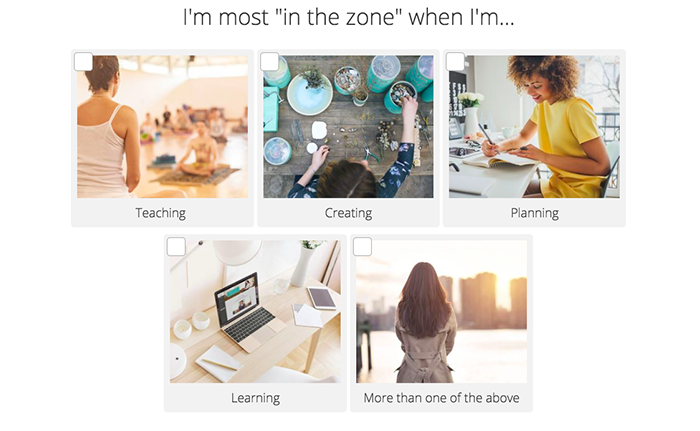New: We will make a fun quiz for your business – Make me a Quiz!
Once you begin building a quiz, one of the first questions that will come to mind is “how do I make this fun so people will actually take it?” Which is surprisingly way more difficult than you’d think and really throws people off. We’re not used to creating content that is “fun” even if we’ve been writing for years.
Good news is we’ve seen more than enough examples both good and bad to know what “fun” looks like, and in this article I’m going to take all the joy out of fun by breaking it down to a science you can follow without having to go crazy trying to figure out what fun looks like (okay, I said fun enough)
Here are the principles of “fun” in a quiz.
1. Fun is learning about yourself
Confession, I’m going to use fun and “engaging” to basically mean the same thing, because we all know as marketers that the reason we’re trying to make fun content is to engage the audience and actually get them interested in learning about themselves through our quiz content.
Now that we’re being honest with each other I’ll tell you the worst-kept secret of quizzes. 75% of them have the same exact title, not joking. The title is set up like “Which (Blank) Are You?” or “What Kind of (Blank) Are You?” or “What (Blank) Is Right For You?” where you put whatever your subject is in the blank.
Quiz makers like to have fun with this and they’ll twist it around like “Tell Us About Your Favorite Movies And We’ll Tell You Where To Have Dinner” and silly things like that, but the reality is that is a just a fancy change to the template “What (Blank) Is Right For You?” where the (Blank) is the dinner place you should go to.
Okay, but why does that work? I’m not convinced.
Well it goes back to Maslow’s hierarchy of needs, remember the pyramid thing with food and sleep on the bottom level? (It’s pictured below if you can’t see it in your mind). The top level of the pyramid is called “Self Actualization” and here’s the definition according to Maslow himself.
Self-actualization, according to Maslow, represents growth of an individual toward fulfillment of the highest needs; those for meaning in life, in particular. Carl Rogers also created a theory implicating a “growth potential” whose aim was to integrate congruently the “real self” and the “ideal self” thereby cultivating the emergence of the “fully functioning person”. – Psychology Today
It’s the second part of that quote with the commentary by Carl Rogers that really stands out to me. It says “integrate congruently the “real self” and the “ideal self” meaning that our most core desire is to connect who we are with who we want to be. However, we can’t do that if we don’t know who we are in the first place.
A quiz, even if it’s telling you where to go to dinner based on what movies you like, is helping you understand a little bit better who you are, and with interact’s branching logic feature . you as the quiz creator can actually make a super accurate quiz that takes into account real responses and gives a useful outcome that helps the quiz taker learn about themselves.
I’ve spoken with 1000’s of people about taking quizzes, and one of the most fascinating findings from those conversations is that people are dead honest when it comes to answering a quiz on the internet. I hear things like “I feel like I’m more honest on those personality quizzes than I am in real life” Which, knowing the desire for self-actualization doesn’t surprise me because we want to know who we really are and will therefore tell the truth on an internet quiz if it means the possibility of learning more about ourselves.
Now that’s all pretty deep stuff, and as a simple takeaway just remember that people take quizzes because they desire to know more about themselves.

2. Fun is talking about yourself
If you thought the last point was too long and intense for talking about making a “fun” quiz, brace yourself because this one will get worse (better?). I’m going to argue that the need for self expression is equally necessary to human well-being and that a quiz lets you express yourself by answering questions.
I’m going to start with a pretty wild claim and go from there.
Freedom of Speech, is one of the legally protected basic human rights in the U.S. This social understanding of self-expression and its psychological consequences have been supported by scientific evidence as well. Generally speaking, psychological findings support the idea that self-expression affects people in positive ways (e.g., Freud, 1920/1966; Pennebaker, 1990). From UCSB
My claim is that freedom of speech exists as a fundamental human right because we need it to exist in harmony. If we can’t state our opinions and are constantly told to suppress our ideas and beliefs this is shown to have very negative consequences.
The thing that makes me most proud of the work we do at interact is hearing stories of how the questions in a quiz lead to further real-life conversations where people are able to really express themselves. One story in particular stands out in my mind from Leisa Peterson who helps people at the intersection of spirituality and money, a very hard place where many people suppress their thoughts (how often do you hear anyone talk about their personal finances? it’s no wonder money is a leading cause of stress).
Leisa said that her quiz doesn’t just get new email subscribers and drive sales, but it drums up real conversations where she can talk with her customers and potential customers in real detail based on how they answered the quiz. Something about a quiz makes people more willing to open up and all it takes is one opening to really get meaningful self-expression going.
Once again we got really serious with this one, but that’s what is needed because it’s not so much how you can write something that is goofy and fun but rather understanding why people find quizzes to be fun in the first place. We find them fun because they let us act out on self expression and that is a basic human need.
3. Fun is irreverence
I’m going to take a sharp right turn and seemingly contradict what I just said in the first two points.
Now what I’m saying is that if you want to achieve helping people learn about themselves and provide an opportunity for self-actualization, you have to be irreverent. The thing is that while we want those things, to understand ourselves better and to self-express, we don’t want to enter the space where those things happen. We avoid the very things that make us joyful.
The way to get into a real conversation without pushing people away with too much seriousness is to be goofy.
For example, instead of asking someone in a very serious tone “What is it about summer that makes you happy?” which is a perfectly normal self-expression question but something you might hear your therapist ask, you can ask “Which set of emojis describes your summer?” which is actually the same exact question.
It’s about how you “frame” the question, the way you look at it. One way to look at it is straight-on, in a deadpan serious manner, but another way to look at it is with fun and going at things with emojis and pictures which will get you the same end result but not brush people off with your tone.
4. Fun is images and gifs
Greenpeace used interact to create this quiz which I’ve taken a bunch of times mostly just to watch the polar bear do a belly flop in the snow. (I took a screenshot below but it doesn’t move so you have to check out the actual quiz to see it).
This point is kind of a continuation of the last one. Pictures can speak a thousand words, and many times it’s a lot easier to absorb a set of pictures and find the one that represents you rather than having to read through a bunch of text and choose an option. Gifs are just one step further on that same line of reasoning.
The best (most fun)format for quiz questions is a text question with an image or gif to represent each answer choice.
5. Fun is hypothetical scenarios
Answering “What if” scenarios is a lot of fun. It lets us imagine and daydream while taking a quiz. The reality of online quizzes is that people are taking them while at work and are already daydreaming or distracted from the task at hand. If you put hypotheticals in your quiz you’ll just play right into that and people love it.
Fun fact: I just Googled “hypothetical questions” to find some research on why we like answering hypothetical questions, and it turns out that there are a ton of lists of hypothetical questions, and people search for it 12,100 times a month. If we’re looking for hypothetical questions to answer on our own time, totally unprompted, that probably means we like them.
6. Fun is the mystery of not knowing how questions connect to results
“Spend Some Cash at Target and We’ll Accurately Guess Your Eye Color” is an actual quiz title recently featured on Buzzfeed, and if you look through the quizzes they’ve been making recently there are actually a ton of them with this same format of “Tell Us About (X) And We’ll Tell You (Y).
If we relate this back to our initial two points in this article we can actually see that this type of quiz does both the telling you about yourself and the self expression pieces incredibly well. We’re having someone tell us about ourselves while also self-expressing, and all the pressure is off because it’s framed in such a silly way. We have nothing to lose and if the quiz works and gets the right answer it appears magical.
In Conclusion:
If I had to distill down all the information in this piece down to one thing it would be this.
People take quizzes because they want to learn about themselves (self actualization) and they want to talk about themselves (self expression). However, we don’t naturally want to do those two things head-on, we shy away from them by default. The most fun quiz you can create actually does both of those things in a light-weight manner using irreverence, images, gifs, hypothetical scenarios, and mystery.




